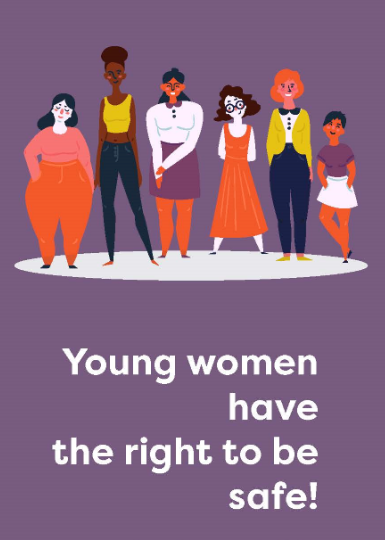PROGRAMS & TOOLS
PREVENTION
PROGRAMMING MATRIX
Enhanced Assess, Acknowledge, Act (EAAA) Sexual Assault Resistance
The EAAA program is a 12 hour, small-group, educational program designed to help college women resist acquaintance sexual assault. Rigorous program evaluation has demonstrated that the program reduces the risk of victimization for at least two years.
Website
http://sarecentre.org/

| Program Name | Level of Evidence | Format | Target Audience | Special Features |
|---|---|---|---|---|
|
Enhanced Assess, Acknowledge, Act (EAAA) Sexual Assault Resistance
|
Supported By Evidence |
|
|
This 12-hour course is for female-identified students |
Learning Objectives
The EAAA program aims to
- impress upon young women that they are at greatest risk of sexual assault from men they know, not from strangers
- improve young women’s capacity to detect risk in men’s behavior and in the environment
- help women overcome the emotional and social barriers to acknowledging these risks
- debunk rape myths and woman-blaming
- challenge the belief that women cannot successfully defend themselves against a (larger) male assailant
- provide young women with the most effective tools for resisting sexual coercion and sexual assault
- provide a space for young women to explore their own sexual desires and relationship values
- reinforce the belief that sexual assault is always the fault of the perpetrator and never the fault of the victim
Methods
- Uses mini-lectures, group activities, role-play, interactive games, and group discussion to present material on positive sexuality, sexual assault definitions and laws, rape myths, factors that increase risk of sexual assault, effective strategies for recognizing danger and resisting sexual assault, among other topics.
- Activities allow participants to assess risk based on evidence; practice responding to coercive strategies; discuss emotional barriers to resistance; explore their own relationship and sexual values and practice negotiating wanted sexual activity.
- Includes instruction on basic self-defense tactics focused on common acquaintance sexual assault situations and designed specifically to be effective against a larger attacker.
Dosage
Four sessions, each three hours long
Logistics
Materials needed to implement the EAAA program include: an EAAA Program Kit (provided with Campus Trainer workshop), a computer and projector, 2 presentation easels, 2 strike pads, and several print-outs. Visit this page for more details about the implementation logistics.
Population Served
Undergraduate students of all sexual identities who identify as women. Ages 17 - 24.
Theoretical Basis For Approach
The EAAA program is based on feminist and social psychological theory, most notably Nurius and Norris’s (1996) cognitive ecological model of women’s responses to sexual coercion as well as reviews of research evidence (i.e., by Rozee and Koss (2011) and Ullman (1997) on the most effective strategies for resisting sexual assault).The fourth unit dealing with positive sexuality is adapted from the Our Whole Lives Sexuality (OWLS) education curricula (Kimball, 2000).
Program Effectiveness
The researchers at the University of Windsor conducted a rigorous evaluation of the program using a randomized-control design. The study demonstrated the 1-year risk of rape and other forms of sexual assault was significantly lower among those who completed EAAA, also called the Flip the Script with EAAATM program (Senn et al., 2015). Further research has determined that these effects last for up to 2 years (Senn et al., 2017). In addition, the program reduced women-blaming as well as self-blame in women who took the program and were subsequently sexually assaulted (Senn et al., 2017; in press). The CDC (Basile et al., 2016) has included EAAA as one of the very few programs (of any type) available with demonstrated effectiveness for sexual assault prevention
PARTICIPATING COLLEGES AND UNIVERSITIES
Carleton University, University of Windsor, University of Otago, Monash University, Stanford University, University of Iowa and others in North America, Australia and New Zealand.
CONSIDERATIONS FOR ADMINIsTRATORS
This program has demonstrated efficacy in reducing the incidence of rape, attempted rape, and other forms of sexual violence, which no other programs on this website have accomplished. This type of evidence could make it easier to get buy-in and funding to implement the program. Because the program is only for students who identify as women, most campuses, it is best conceptualized as one part of a comprehensive prevention strategy. Most campuses implement it as supplementary to required programming for incoming students. Keep in mind that there may be resistance from stakeholders to bringing in a program that emphasizes self-defense as a risk-reduction tactic, since some feel it has in the past contributed to a culture of victim-blaming.
HOW TO ACCESS THIS PROGRAM
The SARE Centre offers a 6-day EAAA Train the Trainer workshop. The cost is $3,300 CAD + HST. Visit the website or contact SARE Centre for more information.
Sources
Basile, K. C., DeGue, S., Jones, K., Freire, K., Dills, J., Smith, S. G., & Raiford, J. L. (2016). STOP SV: A technical package to prevent sexual violence. Retrieved from Atlanta, Georgia: https://www.cdc.gov/violenceprevention/pdf/sv-prevention-technical-package.pdf
Kimball, R.S. (2000). Our Whole Lives: sexuality for adults. Boston: Unitarian Universalist Association.
Nurius, P. S., & Norris, J. (1996). A cognitive ecological model of women's response to male sexual coercion in dating. Journal of Psychology and Human Sexuality, 8(1), 117-139.
Rozee, P.D., Koss, M.P., (2001). Rape: A Century of Resistance. Psychology of Women Quarterly, 25 (4), 295-311. doi: 10.1111/1471-6402.00030
Senn, C.Y., Eliasziw, M., Barata, P.C., Thurston, W.E., Newby-Clark, I.R., Radtke, L., & Hobden, K.L. (2015, June 11). Efficacy of a Sexual Assault Resistance Program for University Women. New England Journal of Medicine, 372 (24), 2326 - 2335. doi: 10.1056/NEJMsa1411131
Senn, C. Y., Eliasziw, M., Hobden, K. L., Newby-Clark, I. R., Barata, P. C., Radtke, H. L., & Thurston, W. E. (2017). Secondary and 2-Year Outcomes of a Sexual Assault Resistance Program for University Women. Psychology of Women Quarterly, 0361684317690119.
Ullman, S.E. (1997). Review and critique of empirical studies of rape avoidance. Criminal Justice Behavior, 24(2), 177-204. doi: 10.1177/0093854897024002003
